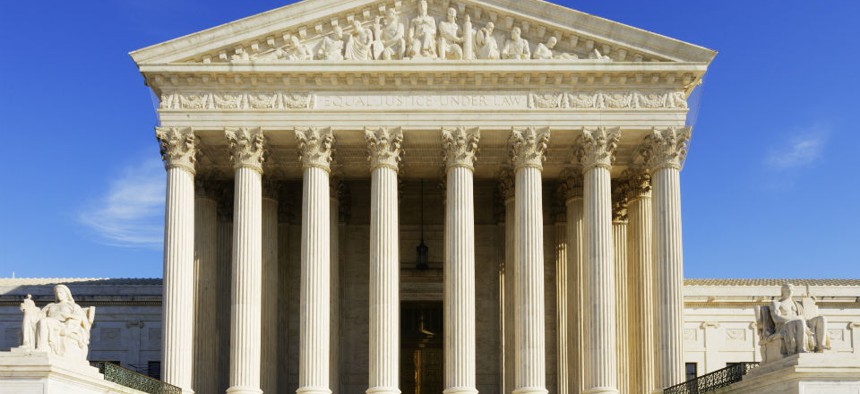
fstockfoto / Shutterstock.com
How The Supreme Court Can Kill Obamacare Without Overturning It
A challenge to the law's subsidies would deeply undermine its basic structure.
The latest Supreme Court case over Obamacare is technically just a challenge to one regulation, not even to the law itself—but it could nevertheless make the law's basic structure completely dysfunctional.
The legal challenge over the law's insurance subsidies could tear apart several sections of the Affordable Care Act, setting off an insurance "death spiral" that could make the law unworkable in more than half the country. That's because the subsidies are part of a complex, interwoven set of policies that aim to balance out each state's insurance market.
Earlier this month, the justices agreed to hear oral arguments in King v. Burwell, a lawsuit that says the IRS broke the law by making Obamacare's subsidies available nationwide. The plaintiffs say subsidies should be available only to residents of the 14 states (plus the District of Columbia) that set up their own insurance exchanges.
The White House and its allies, on the other hand, argue that Congress clearly intended for the same system to function in all 50 states, no matter who does the technical work of running the exchange.
But if the law's defenders can't convince five justices they're right, the law could begin to unravel in the 36 states that aren't running their own exchanges.
First and foremost, roughly 4 to 5 million people who are now receiving financial assistance would lose it. The vast majority of Obamacare enrollees are receiving tax subsidies, which are offered on a sliding scale based on income, and most of them live in the 36 states that didn't set up their own exchanges.
Everyone who meets both criteria would lose their subsidies, which help cover part or all of their premiums.
Of the 4 to 5 million people who would lose their subsidies, as many as 99 percent probably would no longer be able to afford their coverage, according to a court brief filed by 48 mostly left-leaning health care economists (including Jonathan Gruber, the Obamacare boogeyman du jour). Those people would likely drop their coverage.
"The Supreme Court has to look at this for what it is, which is a political case to kill the Affordable Care Act, but it's going to do a great deal of collateral damage," said Timothy Jost, a law professor at Washington and Lee University and an Obamacare supporter.
It doesn't stop with 4 million to 5 million people dropping their coverage. The lawsuit would also eliminate the employer mandate in federally run exchanges. And it would dramatically weaken the individual mandate. The mandate includes an exemption for people who can't afford coverage, and without subsidies, millions more people would qualify for that exemption.
The subsidies and the individual mandate are two sides of the same coin: Both were conceived to help get more people—especially young, healthy people—into the system. Getting healthy patients into the system is the best way to offset the costs of guaranteeing coverage to the people who need it most—those with preexisting conditions.
But if the Supreme Court sides with the King challengers, the two biggest tools to create a balanced marketplace would disappear or become substantially weaker in 36 states. And in the meantime, the law's more expensive provisions—like the requirement that insurers cover everyone—would still be on the books.
So, the only people buying insurance would be the desperately sick people who will take it at almost any cost, and insurers would have to cover those patients, but without a flow of healthier customers to offset the cost.
"Basically, you have a market where you don't have healthy people," Jost said.
And that has its own ripple effects. Hospitals would likely see more patients who can't pay their bills, driving up "uncompensated care"—which has just begun to decline, Jost said. Doctors and other providers would also have fewer customers.
According to the health economists' amicus brief, a decision in the challengers' favor would likely mean that roughly 6.5 million more Americans would be uninsured.
In addition to people who would lose a subsidy and drop their coverage, the economists predict broader effects from the loss of the employer mandate and other spillover effects. With such unhealthy risk pools remaining, all or many insurers would likely pull out of at least some states' exchanges altogether.
There are no easy fixes. Theoretically, Congress could fix the statute's unclear phrasing and codify the status quo of subsidies in all 50 states. Alternatively, Republican governors could take over their states' exchanges, which the federal government has already built, ensuring that their residents keep getting financial help. But politically, those are both unrealistic.
"I think there is some risk that it could create a political situation that would destabilize all the gains that have been made on access to health care," Jost said. "I don't know how long we could have a situation where all the blue states had generous federal funding to ensure virtually their entire population, and the red states have no federal funding."
(Image via fstockfoto / Shutterstock.com)






